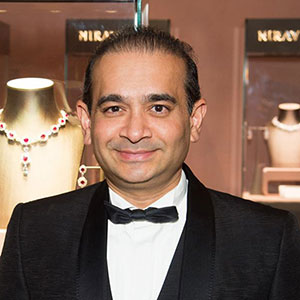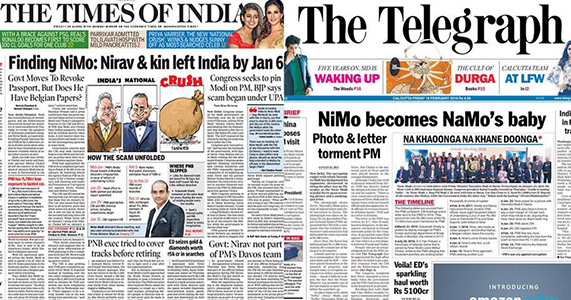
For a long time, Nirav Modi seemed the epitome of the new generation diamantaire. He was flashy yet soft-spoken, boasting both diamond and business-school pedigrees. In recent years, he’d kept company with Bollywood celebrities, part of a strategy to boost his profile to promote his retail chain.
His profile has been raised now, though probably not in a way he ever intended. This new-school diamantaire has been caught in a very old-school industry banking scandal, one that has also ensnared his veteran businessman uncle, Mehul Choksi, managing director of the Gitanjali Group.
For us in the United States, it may be hard to understand all the saturation coverage this scandal is getting in India, where it’s spawned endless headlines, hashtags, and cartoons. For instance, Modi is now regularly called NiMo. The search for him is now called #FindingNiMo.

The looters! @mail_today cartoon #PNBFraudCase #NiravModi pic.twitter.com/r2TBmX2xGc
— Satish Acharya (@satishacharya) February 16, 2018
Perhaps it shouldn’t be surprising this scandal has garnered so much attention—it involves two of the wealthiest people in India, both of whom have fled the country and are now missing. There is also a political dimension: What was Modi doing in India’s Davos delegation shortly before the scandal broke?
In addition, since the bank in this scandal—Punjab National Bank—is state-owned, the case involves the possible misuse, and poor oversight of, public funds. (Several bank employees have also been arrested.) As this very good explainer below points out, the amount said to be involved—over $1 billion—amounts to one-third of PNB’s market capitalization. (Modi’s lawyer disputes both the allegations and the amount involved.)
The unfolding scandal also raises lots of questions and issues for the industry. It could make new lenders reluctant to enter the sector, though that relationship had become very strained already. As a recent Economic Times article put it, “bankers in India have learnt not to trust the diamond trade”—though that article also quoted puzzled diamantaires as to why banks shy away from small- and medium-sized dealers and yet lent tons of money to Modi.
There are also a lot of question marks hanging over two of the companies connected to the principals—Modi’s Firestar International and Choksi’s Gitanjali Group. (The website of the latter is still offline at press time.) Firestar owns both Sandberg and Sikorski and A. Jaffe. Gitanjali owns the Samuels retail chain, Diamlink, and Jewelry Marketing Company.
While Firestar is not public—though that was apparently in the cards—Gitanjali is. Choksi reportedly only controls about 28 percent of Gitanjali’s shares. It’s certainly possible that company will get restructured at some point.
It’s also likely that well-performing divisions will soon be snapped up. Last year, both Mercury Ring and Interjewel USA were reportedly purchased by Unique Designs, a division of Kiran Group.
In any case, while this scandal is terrible news for the industry, some view it as inevitable. Without prejudging the investigation here, it’s safe to say that these two companies are not the first to be accused of playing games with banks.
“The banks think [major companies] will be too big to fail,” said one industry financial source. “So they tried to plug a hole and created another hole. They were all hoping for a soft landing. The regulators finally said enough is enough. They don’t take things like this anymore. And that’s good.
“In the end, this is healthy,” says my source. “The bad practices have to be weeded out. The industry needs a fresh start.”
(Top image: Nirav Modi, from Facebook)
- Subscribe to the JCK News Daily
- Subscribe to the JCK Special Report
- Follow JCK on Instagram: @jckmagazine
- Follow JCK on X: @jckmagazine
- Follow JCK on Facebook: @jckmagazine